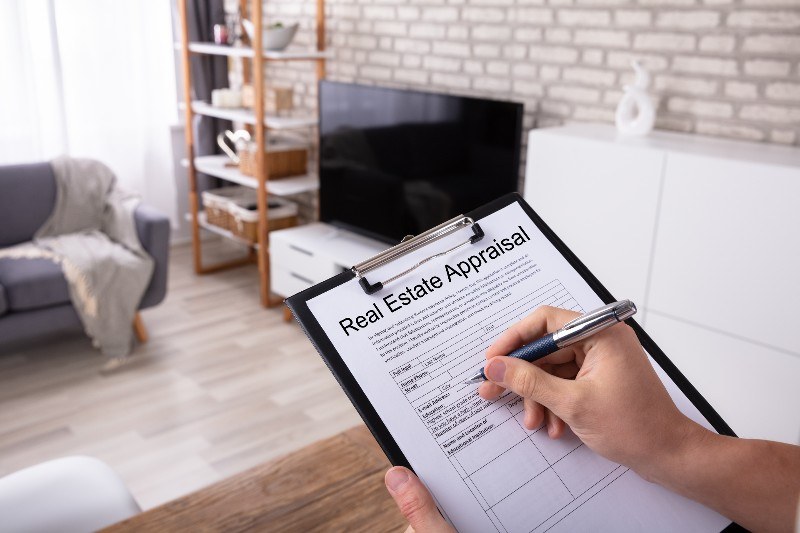A home appraisal is an important part of the home selling process. Anytime a home loan is requested, an appraisal must be completed. The appraisal is an assessment of how much the home is worth based on a visual inspection, the recent selling price of comparable properties, location, and the home’s amenities (such as square footage and bedroom count).
Why is an appraisal important?
Lenders don’t want home buyers to borrow more than the home is worth. If for some reason the buyer defaults on payments and the home goes into foreclosure, the lender will be unable to recoup all the money it lent. Therefore, it's to a home seller’s advantage for a home appraisal to come in close to the buyer's offer price – otherwise, the lender may decline the mortgage.
Appraisal contingencies: Low appraisals have a real impact on home sales. Some home offers come with an appraisal contingency, which means that if the home is valued too low, the contract will be terminated. Approximately 4% of all home sales end up falling through, and one common reason is financing issues due to a low appraisal.
What does an appraisal cover?
The appraiser will do a visual inspection of your home, in addition to research they conduct on your home, the local market, etc. They will be noting:
- The number of bedrooms
- The number of bathrooms
- Square footage
- Amenities (pool, balcony, etc)
- Layout
- Appliances
- Storage space
- Garage space
- And more.
An updated and roomy kitchen with new appliances, for example, will add more value to your appraisal than a small, outdated one.
They will also be evaluating the quality of your:
- Roof
- Foundation
- Siding
- Plumbing
- Windows and doors
- HVAC system
- Overall structure
- Flooring
- And more.
A newly installed HVAC system, for example, can add more value to your appraisal than a 15-year system.
The appraiser is going to research your home and evaluate:
- Proximity to local schools
- Proximity to nearest metro area
- The home’s construction quality
- How busy the road is
- Available parking
- Nearby amenities (groceries, etc)
- What comparable homes sold for
- The current real estate market
- And more.
Do appraisers check under the sink?
Appraisers do not always check under the sink. Why? Even if the home has (for example) a leaky garbage disposal, it's not usually enough of an issue to impact the home's appraised value - an appraiser isn't an inspector. A $100 problem, for example, won't typically impact the appraisal amount. But they can check, and they may - especially for FHA loans, in order to check for structural damage.
Do appraisers go inside the house?
In order to correctly conduct an appraisal and check on the condition of your flooring, windows, HVAC system and more, the appraiser needs to come inside the home.
How much does a home appraisal cost?
According to The Balance, the average home appraisal costs $300 to $450 for a single family home. However, the exact amount can vary depending on location and complexity.
According to ProMaster Appraisers,
- The average cost in Philadelphia, PA for a single family home or condo appraisal is $370.20.
- The average cost in Orlando, FL for a single family home or condo appraisal is $423.99.
- The average cost in Baltimore, MD for a single family home or condo appraisal is $460.07.
It’s clear that location plays a big role in price. Complex homes – like waterfront homes, sustainable (green) homes, historic homes, and farms – will also have higher appraisal costs.
Who pays for home appraisals?
In a typical home sale, the buyer pays for the home appraisal – and these are part of the buyer’s closing costs. After all, it's the buyer’s lender who is requesting the appraisal.
Does a messy house affect an appraisal?
A messy house shouldn’t impact your appraisal. Here’s why: the appraiser is there to evaluate your home, not your stuff. Appraisers are, in fact, trained to ignore messes.
However, it’s worth keeping in mind three things.
- Extensive messes can prevent appraisers from fully accessing your home and its features, which can lead to a lower appraisal.
- It’s a reality that people operate on subconscious biases, and these biases can impact how we interpret value without us realizing.
- Extreme clutter and dirt can impact the appraisal, because it can impact the home itself.
“Generally speaking, a messy house with scattered clothes, toys or belongings does not affect an appraisal. Appraisers are professionals that have been trained to look past the clutter and assess the true value of the property,” explains Albert Lee, Founder of Home Living Lab.
“That being said, extreme clutter with bulky items and furniture everywhere would prevent the appraiser from assessing the structural integrity of the house properly. This will affect the valuation of the house as appraisers are forced to err on the side of caution when they do not have the full picture.”
What negatively impacts a home appraisal?
Since an appraisal covers the overall condition of your home, pretty much any structure can negatively impact the appraisal. The appraiser will consider things like the age of your plumbing and roof, the building materials used to construct your home, and unusual features that add value (like a finished basement or an outdoor space in an area where few comparable properties have yards). Mostly, the appraisal is going to be impact by your home's location, the square footage, etc. - things that are difficult to change.
How long is a home appraisal good for?
A home appraisal is good for 120 days (a total of four months). If your home doesn’t close within that time frame, you’ll need to order a new appraisal.
How to prepare for a home appraisal
Even though most factors that impact your home appraisal are outside your control, there are some steps you can take. Numerous small issues can otherwise add up, and collectively can hurt your home appraisal.
- Clean and tidy your home. It may not help, but it certainly can’t hurt.
- Clean your yard. Curb appeal is important for first impressions.
- List out all the upgrades and updates you’ve made to the home. Include any relevant building permits.
- Take care of all small fixes. Although a single broken sink drain is not going to impact your appraisal, multiple things in need of repair can add up.
- Make sure all safety equipment is installed and fully operational. When was the last time you changed the batteries in the smoke detectors?
- Have your agent attend, or attend the appraisal yourself. This way you can point out things that may not be quickly evident (improvements made to the home, the new grocery store within walking distance, etc).
Can I appeal a low home appraisal?
A lower than expected home appraisal can derail an otherwise successful home sale. Luckily, there are a few ways you can fight back against a low appraisal.
- Look for errors in the appraisal itself. According to the Bureau of Consumer Financial Protection (CFPB), the buyer’s lender is required to provide them a copy of the report. Obvious issues like outdated comps or incorrectly calculated square footage are easy to push back on. Provide documentation to the appraiser to support your claim.
- Order a second appraisal. While this is an additional cost, it can be worth it if you feel that the initial appraisal was truly unfair. Florida homeowners recently made the news when their second appraisal came in 40% higher than the first one, allegedly due to racial bias.
- Split the difference. In order to save the home sale, you can offer to split the difference between the agreed price and the appraised price with the buyer in cash. A low appraisal doesn’t mean a lender will refuse to lend – they just will refuse to lend at the higher price.
For Further Reading



